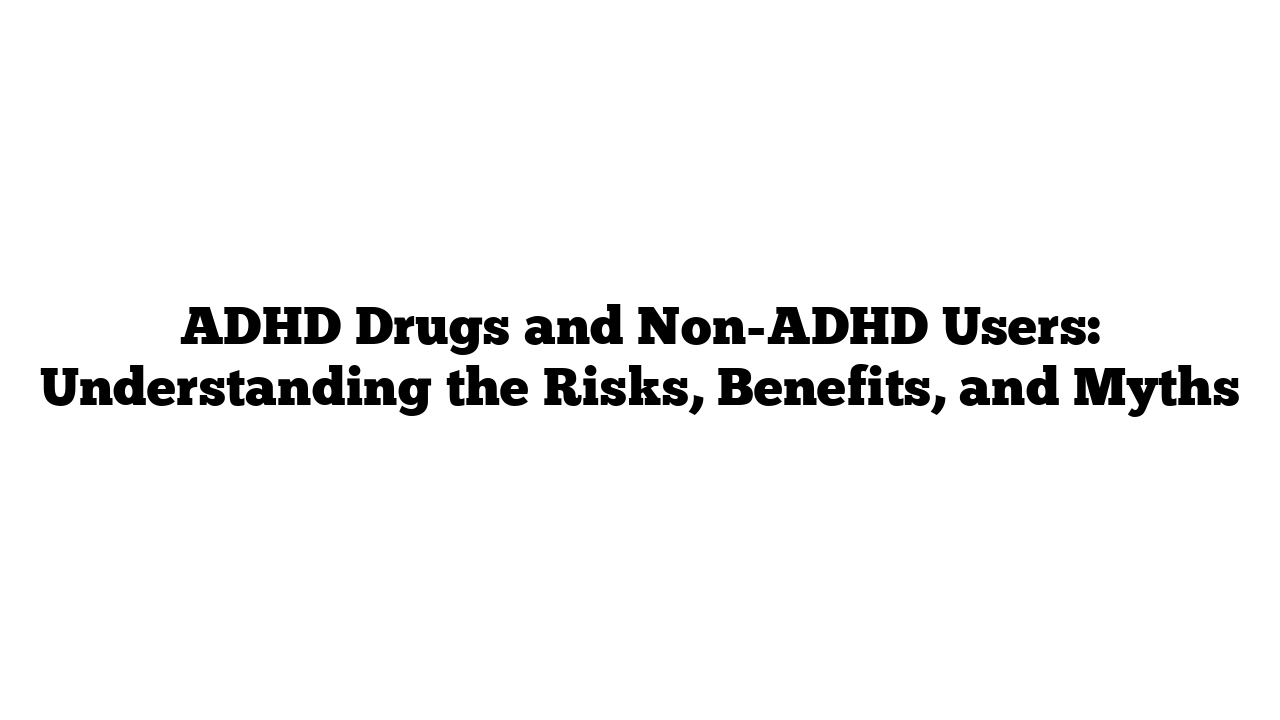Introduction to ADHD Medications
ADHD drugs, such as Adderall and Ritalin, are primarily prescribed for individuals diagnosed with Attention Deficit Hyperactivity Disorder (ADHD). When used correctly, these medications can help improve focus and reduce symptoms in those diagnosed with ADHD. However, many people without ADHD also use these medications, especially in high-stress environments like college, believing they can enhance focus, memory, and productivity. But is this belief accurate, or is it surrounded by misconceptions?
This article dives into what happens when someone without ADHD takes ADHD medications, exploring both the potential effects and the risks involved.
What Are ADHD Drugs, and How Do They Work?
ADHD medications are generally stimulants. These drugs stimulate the central nervous system, helping people with ADHD focus and block out distractions by influencing the brain’s dopamine levels.
- Dopamine and Focus: Dopamine, a neurotransmitter associated with reward and motivation, plays a critical role in focus and attention. Individuals with ADHD often have lower dopamine levels in the brain, making it challenging to stay motivated on tasks that don’t provide immediate gratification.
- How ADHD Drugs Help: By increasing dopamine availability in the brain, ADHD drugs help those with ADHD stay focused on essential tasks, whether they’re at school or work.
For people diagnosed with ADHD, taking medication like Adderall can significantly improve their ability to organize, plan, and complete tasks without distraction. However, for those without ADHD, the effects can be quite different.
A Brief History of ADHD Drugs
ADHD drugs trace back to the early 1900s when amphetamines like Benzedrine were first introduced in the United States. Initially prescribed for various ailments, from head colds to weight loss, these drugs gained popularity during World War II, where soldiers used them to stay alert. By the 1960s, however, concerns arose as doctors noted troubling side effects, including addiction and psychosis. To address these issues, the U.S. government classified amphetamines as Schedule II drugs in 1971, indicating their high potential for abuse and dependence.
Interesting Fact: The ADHD diagnosis itself only became mainstream in the 1980s, transitioning from ADD (Attention Deficit Disorder) to ADHD (Attention Deficit Hyperactivity Disorder), a term more accurately representing the range of symptoms.
What Happens If You Don’t Have ADHD but Take ADHD Medication?
The appeal of ADHD medications among non-ADHD users lies in the misconception that these drugs can act as performance enhancers. Many college students, especially in the United States, use them in hopes of staying awake longer, focusing harder, and retaining more information.
However, research paints a different picture:
- Temporary Alertness, Not Improved Learning: ADHD drugs can keep you awake and help you feel more alert temporarily. However, studies reveal they may not actually enhance learning or memory for people without ADHD. For instance, a study conducted by Dr. Lisa Weyandt at the University of Rhode Island found that these drugs do not improve cognitive abilities such as memory or strategic thinking in non-ADHD users【source】.
- Dopamine Overload and Misplaced Focus: While ADHD drugs increase dopamine, they do not selectively enhance the areas of focus non-ADHD users want. This can lead to “misplaced attention,” where people find themselves obsessing over trivial details instead of productive tasks. Dr. Weyandt’s research noted that some students became so distracted they ended up counting hairs on their arms instead of studying.
- Increased Risk of Addiction and Tolerance: Without medical supervision, taking ADHD medication can lead to addiction. Non-ADHD users may find themselves needing higher doses to achieve the same effects, putting them at risk of a dangerous cycle of dependency and withdrawal symptoms.
- Physical and Emotional Side Effects: The side effects of ADHD drugs for non-prescribed users can be significant and include high blood pressure, headaches, sleep issues, mood swings, and irritability. Combining ADHD medications with alcohol or other drugs intensifies these risks.
The Stigma and Real Struggles of ADHD
People with ADHD often rely on medication to level the playing field, not to gain an edge. For those with ADHD, medication doesn’t create an advantage but merely allows them to function at a level similar to those without ADHD.
A real-life example comes from Gloria, a therapist with ADHD, who shared her experience. She explained that taking medication finally allowed her to complete simple tasks, like folding laundry. “People don’t realize that the medication doesn’t make us superhuman,” she said, “it just helps us meet everyday expectations”【source】.
The Importance of Responsible Medication Use
ADHD medications can be transformative for those diagnosed with ADHD. However, using these medications without a prescription can lead to serious consequences. If you’re considering ADHD medications, it’s essential to understand:
- They are not “smart pills.” Without ADHD, these medications won’t make you smarter or necessarily help you achieve better grades.
- Consult a professional: ADHD medications should only be taken under medical supervision. Discussing potential symptoms with a healthcare provider is the best way to ensure appropriate care.
Key Takeaway: ADHD Meds Aren’t Magic
For people with ADHD, medications like Adderall can be life-changing, helping them manage symptoms and function effectively in daily life. But for those without ADHD, these drugs don’t offer the cognitive enhancement many hope for and carry significant risks.
If you’re curious about ADHD or wondering if you have symptoms, a great first step is to visit a medical professional for guidance. For more informative articles, visit medicaltimes.io.
